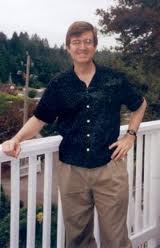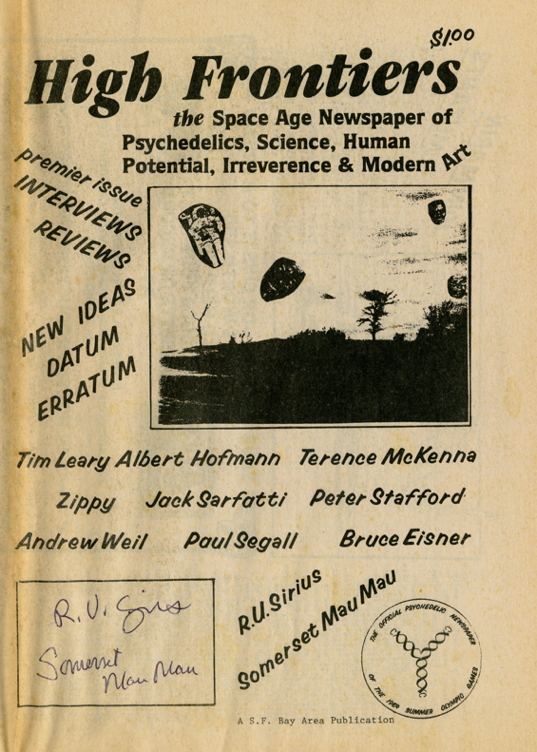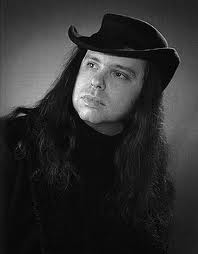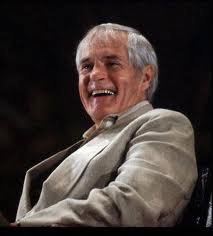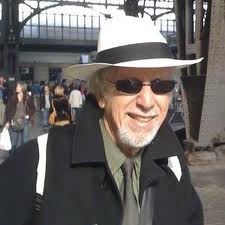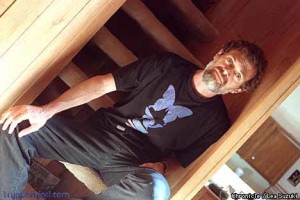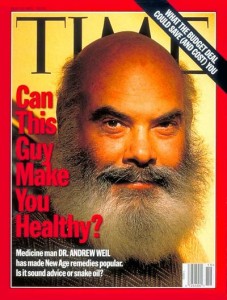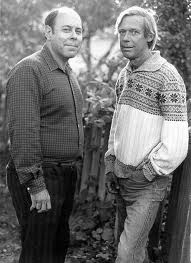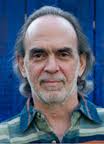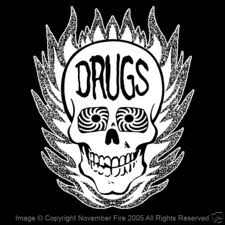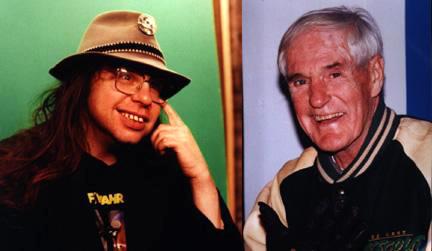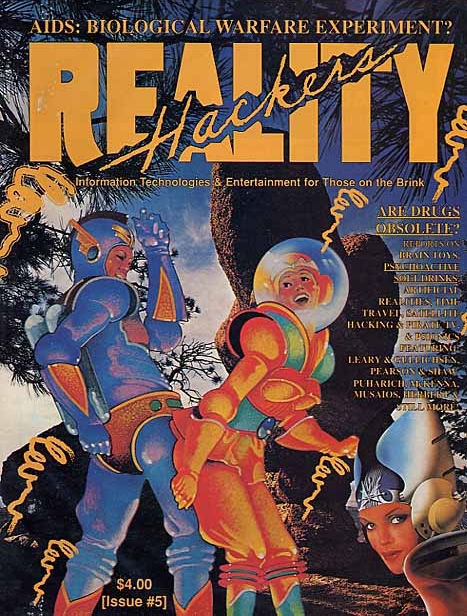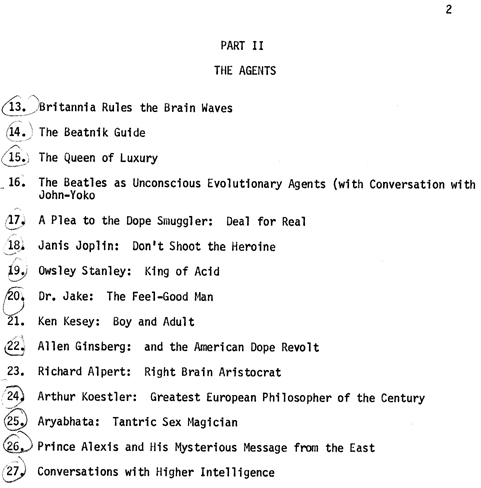
“I felt this glow at the base of my spine, and I felt a warm substance rising through the spine. I had a terrific hard-on, like a Yule log. I wasn’t thinking anything sexual. And then I had, like, an explosion of this substance in my head! It was orgasmic, but it was like a cosmic orgasm. And I felt a golden—I just equate it with the color gold—it was gold, and it just flowed over my brain! It was just ecstatic.”
The ’80s were a grim time for kids in search of higher consciousness. Cocaine, capitalism, hedonism and hairspray held sway, and all the things our parents had revered—psychedelic sacraments, meditation, tribalism, gentleness, artistic expression—were considered hopelessly uncool. Not surprisingly, the music of the day reflected this shift: “Turn off your mind, relax and float downstream†had given way to “Everybody Wang Chung tonight.â€
One of the few psychedelic treasures that mushroomed from this manure was Love and Rockets, a British alternative rock band comprised of three former members of the pioneering post-punk group Bauhaus. L&R broke through to mainstream American audiences in 1986 with its second album, Express—a title that, on one hand, challenged the group’s hair dye-sporting, trench coat-clad fan base to communicate through art, and on the other, proclaimed that the magical mystery tour bus of the ’60s had been replaced by a faster, sleeker mode of transport to the astral realms. When bassist/vocalist David J urged, “All aboard the Express Kundalini,†it was in much the same spirit that yesteryear’s psychedelic pied pipers had inquired, “Is everybody in?†and “Are you on the bus?†But the band’s stylish, cutting-edge sound left no question: This train was headed out there where the rainbow-painted buses didn’t run.
Enticed by the palpable whiff of LSD-fertilized spirituality emanating from Love and Rockets’ music, some of us accepted the invitation. With the aid of various enchanted fungi and exotic potions, we traversed the weird and wonderful landscapes of the hidden self. David J served as a friendly, wise, cosmically cool tour guide, directing us to let our flesh melt into pulsating whorls of electrical ectoplasm (“You are disintegrating into everything around,â€), nudging us toward the realization that enlightenment can only be found in the present moment (“Are you in search of somewhere or something that rings true? Well, it could be closer than you think,â€) and gifting us with Alan Watts-ian bits of mind-origami (“You cannot go against nature, because when you do go against nature, it’s part of nature, tooâ€).
J, who explores the mystery of mortality on his latest solo album, Not Long for this World, insists that the essence of chemically catalyzed gnosis can’t be captured in words. “It’s like the Tao: ‘The Tao that can be expressed in words is not the Tao,’ and the psychedelic experience that can be expressed in a song lyric is not really the psychedelic experience,†he offers. “But it can give you a little hint. And maybe you can dance to it at the same time, which is fun.â€
DAMON ORION: Tell me about your first psychedelic experience.Â
DAVID J: I didn’t really get into psychedelics until ’85. It was the time of the first Love and Rockets album [Seventh Dream of Teenage Heaven]. In fact, the collage that’s on the inside of the gatefold sleeve—that was finished on LSD, on the day of my first trip. I remember doing that tripping balls! [Laughs] And being quite delighted with it.
This was after a very long day in the English countryside. It was a place called Castle Ashby. Perfect place. Great setting, and I had the right mindset. I’d chosen the place, chosen the day: July 4th, 1985. I’d collected music — I was going to play Steve Reich, which I thought would be appropriate. I’d taken the tab, and I had all these cassettes all over the floor of my car. In that state, I couldn’t find the tape! It started this mild panic, but then I started laughing at myself for panicking. And I thought, “OK, I’m just going to dig in here and pull something out at random.†I did, and it was The Velvet Underground’s third album. That just turned out to be the perfect accompaniment, and it guided me on that portion of the trip whilst it was playing. I remember looking up at this blue sky, and “Pale Blue Eyes†came on. And the whole sky was made up of thousands and thousands of eyes that were sort of like embossed watermark designs—very subtle, sort of blue-on-blue. Then I realized it was my eye, and when I blinked, all the eyes in the sky blinked with me. And then I saw rays coming down from the eyes—these cosmic rays. They were going into my heart, and it was just very joyous. And as I received, so I gave back, and that built the intensity. So it was like this feedback was building up, like a generator. And what was at the heart of that feeling was love. Then all the eyes went away, and I just felt very connected to spiritual essence. Thank you, Lou Reed! [Laughs] It’s a song about adultery, but it became a trigger, a catalyst, that led me into that experience.
At the end of the day, we [Love and Rockets] all went back to [guitarist/vocalist] Daniel [Ash]’s house—a little terraced house on a side street in Northampton—and we were finishing off that collage. I remember sitting on the floor, looking at Daniel’s antique furniture and thinking how sexy the legs of the furniture were, and remarking on this! [Laughs] The curvature of the furniture, and Daniel just smiling.
DAMON: I love that Love and Rockets was christened with an LSD trip! What other psychedelic experiences have you had that influenced your art?
DAVID: My second experience was very heavy. That was indoors, and I decided to do some drawing and listen to The Beatles’ Revolver and Sgt. Pepper’s. Just something I had to do. So I got as far as Revolver, and I was looking at this sheet of blank paper, and I just started to see this jungle in the paper. It was sort of like the cover of Revolver, but again, it was sort of like this effect of being embossed, almost like watermarks. It was incredibly detailed—there was all this fauna and jungle vines and leaves, and there were little characters in there, sort of like going through the hair on the front cover. And there were animals and all sorts of stuff, but as soon as I focused on anything, it would disappear, and something would come through to take its place.
The music sounded incredible. That was when I was listening to “Tomorrow Never Knows.†Then I remember looking at the back of my hand and seeing through to my bones, seeing the cellular structure, seeing blood coursing through my veins, and then seeing my hand rot in front of my eyes. It was horrific. But I remembered that old adage: the Buddhist thing of “If you see something terrible, do not turn away. If you see something beautiful, do not cling to it.†I embraced that and went into the hand, into the death, and came through the other side. I saw it as a very beautiful process.
There’s a line in one of our songs, “The worm we dug from higher groundâ€â€”that’s what that came from, that experience. So it was the death trip. If I had turned away from it, it could have turned very negative, but thankfully I didn’t. And there was a huge lesson in that.
DAMON: “I know what it’s like to be dead,†indeed! So, as long as you’re referencing the Express album, you’ve said before that you’d sum up that record in three letters: LSD. Can you elaborate on that a little?
DAVID: [Chuckles] This was from my own personal angle, because we weren’t all doing this together. And in fact, at that point, the others were a bit concerned that I was becoming too much of a psychonaut. [Laughs] But I had to have that experience, and it was the right time. And Love and Rockets, being the band it was at the time, was the perfect vehicle, because it was a very psychedelic-leaning band. I was kind of evangelical at that point—I was Timothy Leary back in 1960, you know?
DAMON: Well, I’m happy about that. I think it was really important for people like me, who weren’t around for the ’60s, to have musicians from our own era inviting us to visit those higher planes and fly the friendly skies. So, how did the song “Kundalini Express†come into being?
DAVID: That song originally was gonna be called “Dr. Hofmann,†and it was going to be about Albert Hofmann discovering LSD, but it just sort of mutated into this lyric about kundalini and aligning that with psychedelic experience. Just before I started experimenting with psychedelics, I had a spontaneous kundalini experience when I was meditating. I didn’t know anything about kundalini, but I started to hyperventilate, and then I effectively stopped breathing, which was very strange.
I felt this glow at the base of my spine, and I felt a warm substance rising through the spine. I had a terrific hard-on, like a Yule log. I wasn’t thinking anything sexual. And then I had, like, an explosion of this substance in my head! It was orgasmic, but it was like a cosmic orgasm. And I felt a golden—I just equate it with the color gold—it was gold, and it just flowed over my brain! It was just ecstatic. I had no idea what had just happened, so I started to look into this experience at the library—this was pre-Internet. I discovered kundalini, and I’d had a classic spontaneous kundalini experience. Never had it again.
DAMON: You struck gold there! People who have heard of kundalini can strive for 30 years to get there, and you just stumbled onto it! You mentioned Albert Hofmann. Did you ever meet him?
DAVID: No. I met Timothy Leary a couple of times, though. I was introduced to Tim by his personal assistant, Howard Hallis, who also did Tim’s website, and Howard does my website now. I actually met Tim the first time at Cinematic, this S&M bar in Hollywood where Psychic TV was playing. He invited me to a party at his house, which was a great event. I remember going to the fridge to get a beer, and next to the beers was a cryonic suspension tank for his head! I got to talk to Tim at length. He was interested in Love and Rockets. He actually really liked the lyrics of “No New Tale to Tell.â€
So the last time I spoke to him on the phone, I invited him to a gig we were playing at The Palace in L.A. But I didn’t realize that he’d gone down really quick since the last time I saw him, and he was just staying in bed. But he said, “I’ll be there in spirit.†And he died a couple of days later.
We were on tour at the time, and at the gig that happened the day after he died, I dedicated “Yin and Yang (The Flower Pot Man)†to Tim. That song starts with an acoustic guitar, like a Bo Diddley rhythm. Daniel struck the guitar in a funny way, and it just made the strings feed back in a way I’d never heard before or since. And this vibration just picked up, and I thought, [excitedly] “Let that go, Daniel! Just let it go!†And he thought the same, ’cause he did. I remember him holding his hands up in the air, just lettin’ this thing ring out and build up and up and up.
He started doing this undulating rhythm, and it was echoing ’round this big hall. Kevin [Haskins, the drummer] picked up on it and started doing a bass drum beat to this rhythm, and then the crowd picked up on that and started clapping. We all started clapping in the band, and this tribal sound just grew and grew. It was really something! And at the right moment, Daniel went back to the Bo Diddley rhythm, and we crashed back into the song. The chorus of that song goes, “Beauty, beauty, beauty, beautiful.†Then I saw Howard, who was with Tim when he died. I said, “What were his last words?†He said, “His last words were ‘Beautiful. Beautiful.’†And then the last thing he said to me came back: “I’ll be there in spirit.â€
DAMON: [Loud exhale] Wow. Getting chills here! This seems like a good time to ask: Do you have any hunches about what happens to consciousness after death?
DAVID: [Pause] Hmm. I do have a feeling about it, which is intensified through my meditation, and sometimes I feel I really understand that. But it’s hard to express. I’ll give it a shot: I think there’s an eternal, ever-expanding cosmic center. You can call this God; you can call it whatever you want. You can call it Simon. I dunno. But there’s something out there that’s not just out there—it’s in there, and it’s outside of in there, and it’s outside of out there. And its self-perpetuating is the essence of bliss. And it’s never gonna go away. It cannot go away. That is the thing that abides, and we are here to learn lessons, and for our souls to grow and for that soul-matter to keep coming back to school until we graduate, and then we just become completely absorbed into the center of Godhead, and we remain.
DAMON: Yes. That rings true on an intuitive level. Now, when Love and Rockets put out [1994’s] Hot Trip to Heaven, MDMA had clearly become the new fuel of choice. What’s your take on that drug?
DAVID: That’s a very interesting drug, in that it’s an empathogen. And also, I think it’s an anti-bullshit drug. You can’t get away with being a bullshitter, and you just see through people’s veils, masks and games. You don’t want to play any kind of games anymore. You just want to be real, and you want to relate and share the love. [Laughs] And it’s very beautiful for that. But because it’s so enjoyable, there’s a danger that it can be abused and overused. But I treat all these drugs with a lot of respect, and I think if you approach them with that mindset, then you get back what you give. I think that’s especially true of something like mushrooms, because there seems to be some spirit that resides within the mushroom experience and actually talks to you. You know McKenna’s thing of communicating with that entity? I’ve had that experience.
DAMON: What happened there?
DAVID: One time we were on tour in the States, in L.A., and Daniel and I wanted to get some mushrooms. So somebody from our label at the time got us a big bag of God’s Flesh. Daniel chickened out, which he’s apt to do, so I just started neckin’ ’em. When the person who delivered them came back, she said, “He’s taken that much?! My God!!†I’m hearing this, and it starts coming on. I’m lying on the floor, looking up at the ceiling, which is just turning into spirals and swirls. I could have quite easily panicked, but again, that response kicked in: “No, go with it. It’s cool. It’s gonna be OK.†But I had to get out of the room. I walked down the corridor of the hotel, and there was a big family of Mexicans and all their relatives—it must have been about 20 of these people coming down the hall. I had to make my way through them—they were just thronging. And as I touched them, I was getting these ancestral experiences, just tapping into Aztec imagery.
I was seeing lizards and pyramids and stars exploding. It was going off, you know? And then I got back to my room, put a big coat on and lay on the balcony. All of a sudden I was in this big, revolving mandala of Aztec imagery. And then I was aware of a voice coming through. It wasn’t in any language or anything; it was beyond language. But it was talking to me and saying, “Welcome. You’ve decided to step into this dimension. You’re free to remain, and you’re here of your own volition, your own free will. This is a very ancient world and can give you many gifts. And what you bring to the party is what you leave with,†basically.
The day after, I get up and I draw the curtains, and I see two flying saucers. Really close up. Just hovering in midair. Silver—just classic discs. This was about midday, bright blue sky, and there they are! So I thought, “I’ve got to phone Daniel to tell him about this.†But I couldn’t break away, because it was so compelling. I was straight by then, you know; I’d come down off of the mushrooms. So I called him up. He’s asleep, because he’s a very late riser.
He says, “Dave, this better be fuckin’ important, man.†I said, [hurriedly] “Just go and look out your window, Dan. Now. You won’t regret it.†“Oh, fuckin’ ’ell!†I get the call back: “Dave, you’re trippin’, man. I don’t know what you’re talkin’ about.†“There were two flying saucers, Dan.†“Yeah, OK, Dave. Keep takin’ the mushrooms.†“But I saw the bastards!†And it’s interesting, McKenna’s whole theory about that connection.
DAMON: I was thinking the same thing. Well, it’s been said that these sacred plants and fungi are a kind of telephone that our… galactic cousins have left us as a way of contacting them. It may be that Daniel wasn’t on that particular telephone, but you were. Do you have a take on whether what you saw was real or not?
DAVID: Yeah. I think it was real, yes. I’ll tell you another interesting mushroom story: again, on tour, Love and Rockets. Actually, it was the same batch of mushrooms! [Laughs] I think it was what was left of them in the bag. A week before this incident—this is a real rock & roll cliché—but we were in Chicago, and I was having a bit of a meltdown. It’s the only time I’ve done this, but I went out and got a bottle of whiskey, and I wrecked the hotel room. Trashed it; did a Keith Moon. And then I just thought, “This is so negative. What are you doing?†And I had a big sketchpad I took on that tour, so I thought to draw and try to express my way out of this malaise. I drew a little planet Earth, and then I drew all the planets and stars around it, and I did a big face of Buddha looking down, beatifically smiling on all of this.
I thought, “I’m just this tiny little speck on this tiny little ball in the middle of this vast space. Get your stupid, spoilt-child problems into perspective. You’re living a life that a lot of people would give their right arm for. Get on with it, you fuckup!†It did the trick. Then I’m in a better mindset, and we had the mushrooms in L.A. Then we were on the bus, traveling north up to Canada, and we had to get rid of whatever we had, y’know. So I just swallowed these mushrooms, thinking that we had a day off.
But then, after we crossed the border, the tour manager says, “So, remember, guys, you’ve got a lot of interviews as soon as you get to the hotel. You’ve got about four each. They’re all gonna be waiting in the lobby. These are really important interviews.†And I’m just trippin’ my head off! So I thought, “Well, this will be interesting.†As I was goin’ in [the hotel], my eye caught this really beautiful, angelic-looking blonde girl. I thought, “Well, I hope she’s one of my interviewers.†I went through the first three interviews, and I just fessed up to the interviewers: “Look, I… I’m trippin’.†[Laughs]
DAMON: You must have made the journalists’ day! “I’ve got a live one here!â€
DAVID: [Laughs] Yeah! And they were great about it. So my last interviewer comes in, and it’s this gorgeous girl. Then she said, “Before I start the interview, I’ve got something for you. But I want you to open it after I’ve gone.†So she gives me this little box, wrapped up. And I was just looking into her eyes. Her eyes became swimming pools, and I dived in. We had a lovely time, and then she left.
I decided to run a bath. As I’m running the bath, I open this present, and what is inside it is a little tin globe—a little tin Earth. I thought, “Hold on a minute.†I got my sketchpad out, and I put [the tin globe] over the little Earth that I’d drawn that day [of the hotel trashing], and it was exactly the same dimensions—I mean exactly the same circumference. So I go into the bath, and I take the ball into the bath with me and start bobbin’ it up and down, still trippin’ balls.
Then I start to do AUM in the bath. I don’t know why; I’ve never done that before, but I start to do it. I was just feeling the vibration of the AUM coming through the bath and water, and I was changing the molecular structure of the water, [or] I perceived that I was doing that. And it was a really good bath! [Laughs] And the next day I see Danny, and he said, “Dave, what the fuck was goin’ on in your room yesterday?! I was hearing, like, this dronin’ noise, man!†So I told him the story, and he was quite impressed. He said, “Yeah, I bumped into her on the way in as well. Wish she was my interviewer.†“Well, that’s the way it goes, Dan. She was meant for me.â€
DAMON: Did you keep in touch with her?
DAVID: Nope.
DAMON: Too bad.
DAVID: Well, “If you see something beautiful, do not cling to it,†you know?
A shorter version of this interview was originally published in MAPS Bulletin




